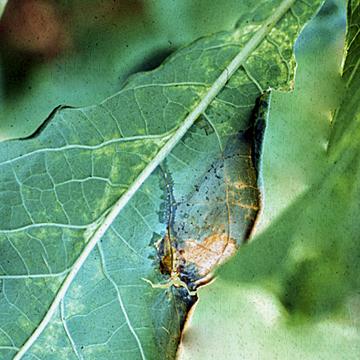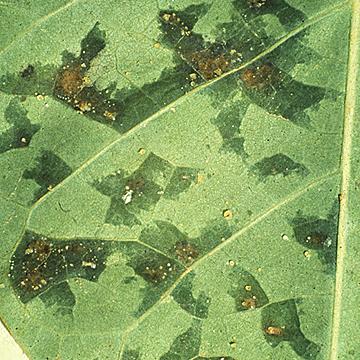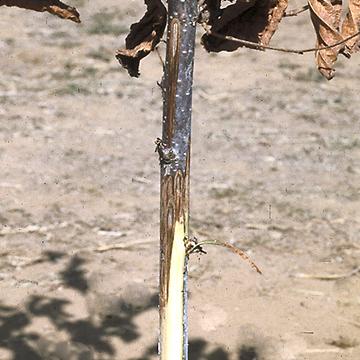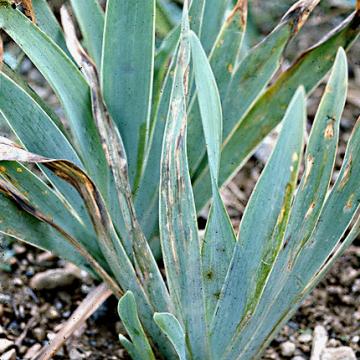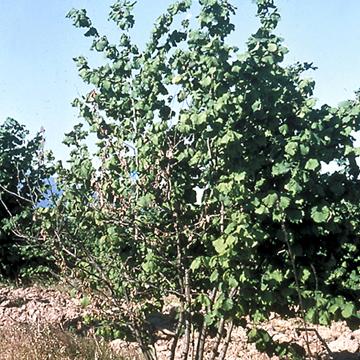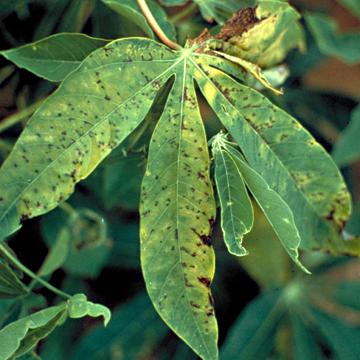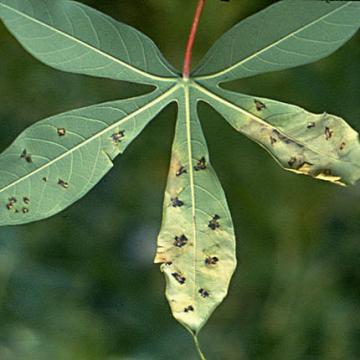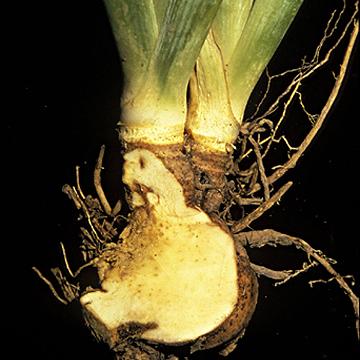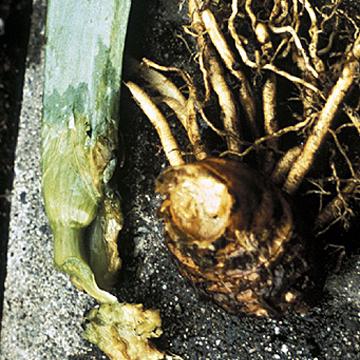DISEASE: Bacterial blight
HOST: Cassava
Leaf with angular, water-soaked, vein-delimited lesions.
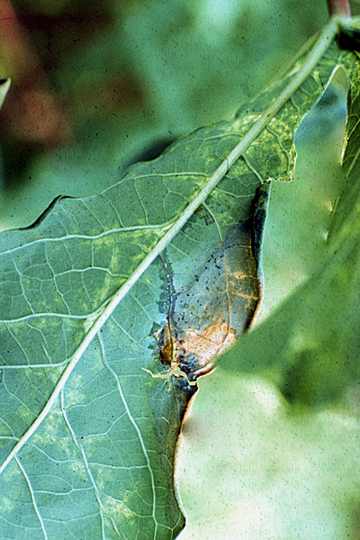
Bacterial blight | Cassava
DISEASE: Bacterial blight
HOST: Cassava (Manihot esculenta)
PATHOGEN: Xanthomonas axonopodis pv. manihotis
PATHOGEN SYNONYM: Xanthomonas campestris pv. manihotis
SOURCE: A. Hayward
DISEASE: Bacterial blight
HOST: Cassava
Cassava with angular leaf spots and yellow ooze. Symptoms include leaf spots, wilt, and dieback. The bacterium frequently invades systemically.
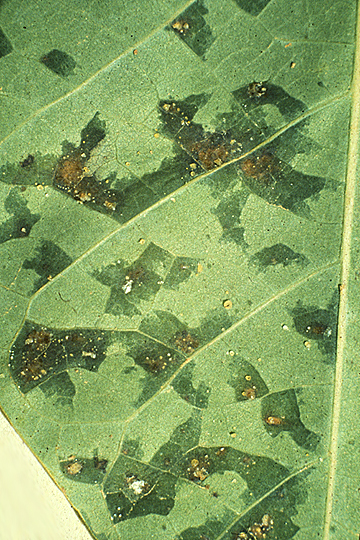
Bacterial blight | Cassava
DISEASE: Bacterial blight
HOST: Cassava (Manihot esculenta)
PATHOGEN: Xanthomonas axonopodis pv. manihotis
PATHOGEN SYNONYM: Xanthomonas campestris pv. manihotis
SOURCE: A. Hayward
DISEASE: Bacterial blight
HOST: Hazelnut
Diseased young tree with discoloration of the cambium. Dieback of young twigs and branches is characteristic. Other typical symptoms are bud and twig necrosis and small, angular or round, water-soaked leaf spots.
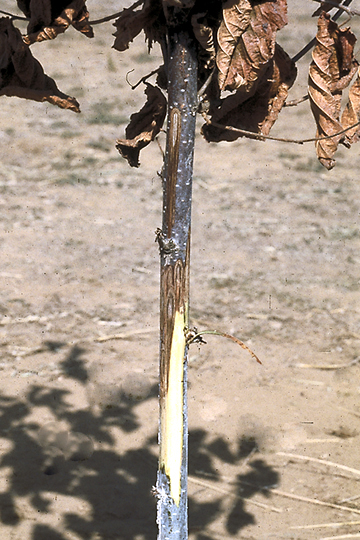
Bacterial blight | Hazelnut
DISEASE: Bacterial blight
HOST: Hazelnut (Corylus americana)
PATHOGEN: Xanthomonas arboricola pv. corylina
SOURCE: J. Pscheidt
DISEASE: Bacterial blight
HOST: Iris
Iris with irregularly shaped, water-soaked lesions and blighted leaves.
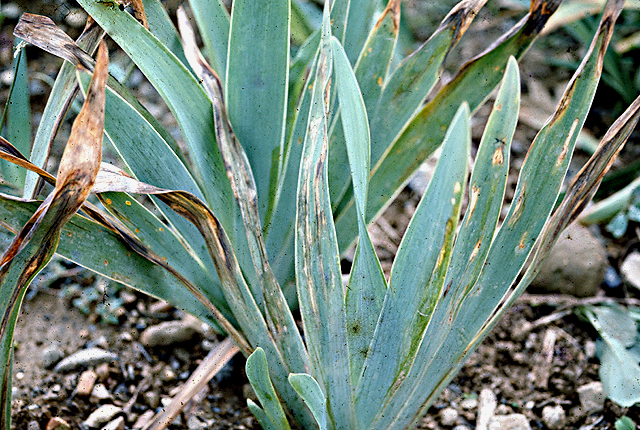
Bacterial blight | Iris
DISEASE: Bacterial blight
HOST: Iris (Iris tectorum)
PATHOGEN: Xanthomonas campestris pv. tardicrescens
SOURCE: M. Goto
DISEASE: Bacterial canker
HOST: Hazelnut
Primary symptoms are failure of buds to break and withering and death of new foliage in spring. Dead leaves remain attached to limbs after normal leaf fall.
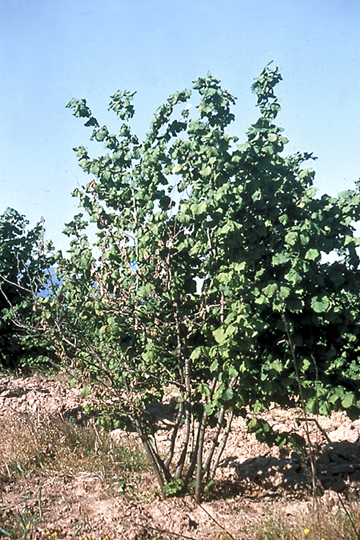
Bacterial canker | Hazelnut
DISEASE: Bacterial canker
HOST: Hazelnut (Corylus americana)
PATHOGEN: Pseudomonas syringae pv. avellanae
PATHOGEN SYNONYM: Pseudomonas avellanae
SOURCE: P. Psalidas
DISEASE: Bacterial leaf spot (Bacterial necrosis)
HOST: Cassava
Cassava with yellowish leaves and water-soaked, angular spots. The disease is primarily on foliage, although the pathogen may invade stem buds and young branches.
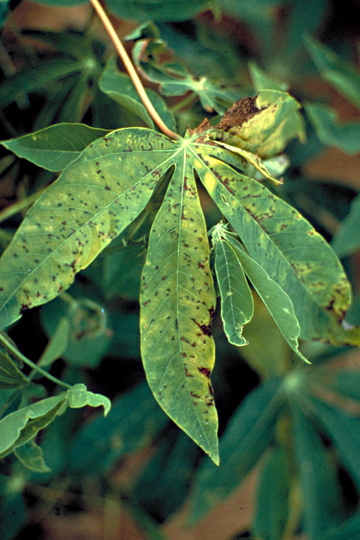
Bacterial leaf spot (Bacterial necrosis) | Cassava
DISEASE: Bacterial leaf spot (Bacterial necrosis)
HOST: Cassava (Manihot esculenta)
PATHOGEN: Xanthomonas cassavae
PATHOGEN SYNONYM: Xanthomonas campestris pv. cassavae
SOURCE: APS
DISEASE: Bacterial leaf spot (Bacterial necrosis)
HOST: Cassava
Cassava with brownish lesions and blackish edges. Leaves turn yellow with multiple infection sites.
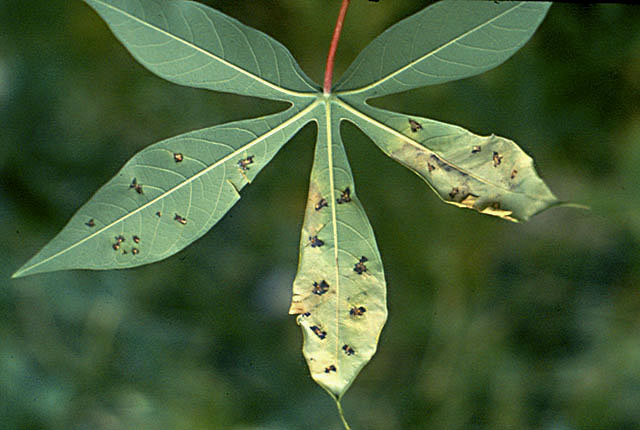
Bacterial leaf spot (Bacterial necrosis) | Cassava
DISEASE: Bacterial leaf spot (Bacterial necrosis)
HOST: Cassava (Manihot esculenta)
PATHOGEN: Xanthomonas cassavae
PATHOGEN SYNONYM: Xanthomonas campestris pv. cassavae
SOURCE: H. Maraite, A. Alvarez
DISEASE: Bacterial stem and rhizome rot
HOST: Iris
Iris stem and rhizome with brown, discolored, rotted portions.
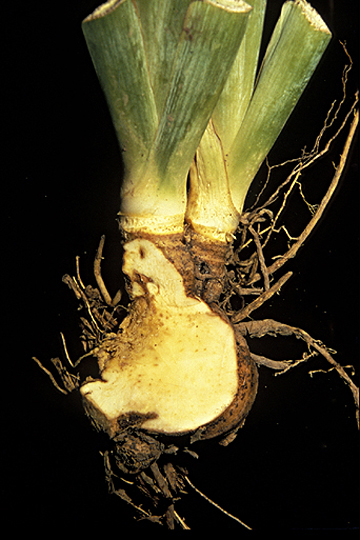
Bacterial stem and rhizome rot | Iris
DISEASE: Bacterial stem and rhizome rot
HOST: Iris (Iris sp.)
PATHOGEN: Burkholderia gladioli pv. gladioli
PATHOGEN SYNONYM: Pseudomonas gladioli pv. gladioli
SOURCE: R. Raabe
DISEASE: Bacterial stem and rhizome rot
HOST: Iris
Mushy rot of stems and rhizomes are characteristic of advanced stage of the disease.
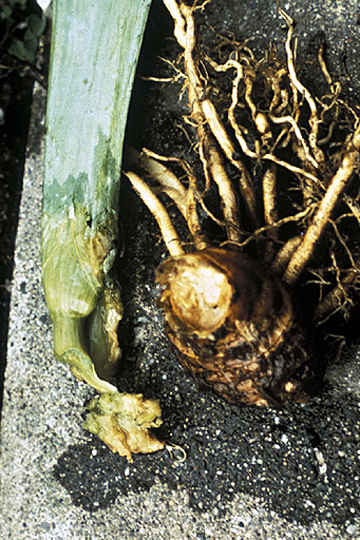
Bacterial stem and rhizome rot | Iris
DISEASE: Bacterial stem and rhizome rot
HOST: Iris (Iris sp.)
PATHOGEN: Burkholderia gladioli pv. gladioli
PATHOGEN SYNONYM: Pseudomonas gladioli pv. gladioli
SOURCE: R. Raabe


